Norman Newell was an English record producer, who was mainly active in the 1950s and 1960s. He was also the co-writer of many notable songs. As an A&R manager for EMI, he worked with musicians such as Shirley Bassey, Dalida, Claude François, Vera Lynn, Russ Conway, Bette Midler, Judy Garland, Petula Clark, Jake Thackray, Malcolm Roberts, Bobby Crush and Peter and Gordon.
This Is My Life may refer to:

Thunderball is the soundtrack album for the fourth James Bond film Thunderball.

"Goldfinger" is the title song from the 1964 James Bond film of the same name. Composed by John Barry and with lyrics by Leslie Bricusse and Anthony Newley, the song was performed by Shirley Bassey for the film's opening and closing title sequences, as well as the soundtrack album release. The single release of the song gave Bassey her only Billboard Hot 100 top forty hit, peaking in the Top 10 at No. 8 and No. 2 for four weeks on the Adult Contemporary chart, and in the United Kingdom the single reached No. 21.

Something is a 1970 album by Shirley Bassey. With her career having been in decline since the latter part of the mid 1960s, Something proved to be Shirley Bassey's comeback when it was released in August 1970. The title track single became her biggest UK hit for many years, reaching No.4 and spending 22 weeks on the chart. This was actually the second single featured on the album, "The Sea and Sand" having already been released earlier. The album was similarly her biggest hit for many years in the album charts, reaching No.5 and spending 28 weeks in the top 50.

Let's Face the Music is the sixth Shirley Bassey studio album, released in 1962 and arranged by Nelson Riddle. Kenneth Hume, Shirley Bassey's husband and manager, wrote the sleeve notes for this album, in which he gives an insight into how this album came to be: "When Vic Lewis booked Nelson Riddle for a tour with Shirley, we were all very excited; being great fans of Nelson Riddle's from way back...so when someone suggested them doing an LP together, we thought that this would not be possible, remembering that Nelson was under contract with another recording company." Nelson Riddle was under contract to Capitol Records at the time, so Bassey's producer Norman Newell went about to secure his services for an album. While on the tour, Bassey, Riddle, and Bassey's music director Raymond Long, discussed what form the album should take. Shortly after the tour was completed, the recording sessions began.
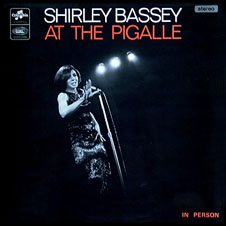
Shirley Bassey at the Pigalle is Shirley Bassey's first live album, recorded on the opening night of an eight-week engagement at the Pigalle, a nightclub in the West End of London. This performance, on 12 September 1965, earned Bassey outstanding reviews. The album was released that same year. It was Bassey's final album for EMI's Columbia label.

I Am What I Am was the only studio album recorded by Shirley Bassey for the Towerbell Records label. Several other tracks were also recorded at this label and issued as singles only. The recording sessions took place at Olympic Studios, Barnes, London, in July and August 1984. Following the success of the previous album All by Myself, this album peaked at number 25 in the UK album chart and reached Gold status. This release was the first digitally recorded album made by Shirley Bassey and was issued on vinyl, cassette and CD. Consisting of mainly re-recordings from Shirley Bassey's back catalogue and two new songs, this album was recorded 'live' with The London Symphony Orchestra, conducted by Carl Davies. The album also reunited Shirley Bassey with Norman Newell, who had served successfully as her producer throughout the 1960s.

Live in Japan is a double album by Shirley Bassey, recorded July 8, 1974 at Kosei-Nenkin Kaikan Hall in Tokyo, Japan. The album was released in Japan only, and the reverse of the cover listed the songs in English and Japanese. Live at Carnegie Hall had been released just a year prior, with nine of the same songs from Live in Japan, and it is believed that this is at least partly the reason Live in Japan didn't gain a worldwide release. Japan was an important growing market for many artists in the 1970s and many recorded live albums exclusively for release in Japan.
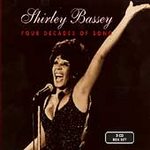
Four Decades of Song is a three-CD compilation from Shirley Bassey issued in 1996. This set features 54 songs recorded between 1959 and 1993. In 2008 EMI repackaged and retitled this boxset as Shirley Bassey The Collection; the new version had six extra tracks.

Shirley Stops the Shows is the seventh Shirley Bassey studio album, her 5th and final studio album recorded for the EMI/Columbia label in the UK. Released in 1965, this album is a mix of standards and showtunes. Shirley Bassey was at a high point in her career, with worldwide success of her single "Goldfinger", but the album failed to chart in the UK, a first for her Columbia albums. The album met with more success in the US, reaching number 85 in the US Pop charts. For the US market it was issued with an alternative running order, retitled Shirley Bassey Belts the Best! and "The Lady Is a Tramp" was replaced by "Goldfinger". Original release was in mono and stereo, both mono versions feature an alternative studio recording of "People" which has not yet been re-issued on CD. The stereo version, remastered, was issued on CD in 2008 together with 12 of Those Songs by BGO Records.

Bassey – The EMI/UA Years 1959–1979 is a 5-CD boxset compilation from Shirley Bassey issued in 1994, this set features 94 studio recordings on four CDs, recorded for EMI/United Artists between 1959 and 1979. Disc five features a previously unreleased live recording from Carnegie Hall. The boxset was reissued by EMI in 2010 in a standard jewel case set.

All by Myself is a 1982 album by Shirley Bassey. Having ended her contract with United Artists around 1980, Bassey took a break from recording, and then began releasing albums on various labels. All by Myself was the first of these, issued on the Applause label. 1982 was the dawn of the CD era, and this was her first-ever album to be issued on CD. The album was also issued on LP and cassette. In the UK and some other countries, the album was titled Love Songs, with identical cover art, and under that name it charted for five weeks on the UK albums chart, on the K-tel label, peaking at #48. The original CD has since become scarce, though the songs have appeared on many compilations.
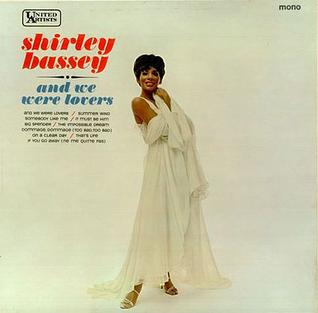
And We Were Lovers is a 1967 studio album by Shirley Bassey. The album featured Bassey's first recording of "Big Spender', the single subsequently hit #21 on the charts.
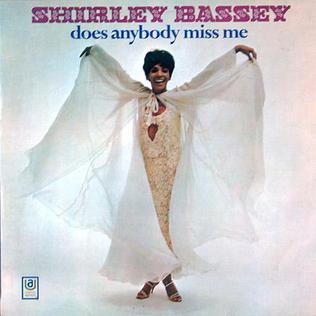
Does Anybody Miss Me is a 1969 album by Shirley Bassey. In 1969 Bassey moved her home to Lugano, Switzerland, with her second husband Sergio Novak, whom she had married in Las Vegas in August 1968. Remaining as a tax exile prevented her from performing and recording in the UK. In this period she continued to perform and record in Italy and the US. This album was recorded in the US and produced by the American producer Dave Pell, with arrangements by Artie Butler. The tracks on this album are a selection of standards and show tunes. The title track Does Anybody Miss Me was issued as a single in the UK, backed with the non album track Fa Fa Fa, but this failed to make any impression on the chart. Does Anybody Miss Me has remained part of her live show and was recorded as the opening track of the album Live At Talk Of The Town in 1970. This album saw Bassey re-record her 1958 UK #1 hit single As I Love You which she had previously released on the Philips label.

The Shirley Bassey Collection is a double compilation album released in 1972 by British singer Shirley Bassey. The album charted at #37 in the UK charts in January 1972.

Love, Life and Feelings is the 21st studio album from Shirley Bassey, released in 1976 on the United Artists label. The album peaked at #13 in the UK album chart, and charted at #149 in the Billboard 200. Love, Life and Feelings was awarded silver record status by the British Phonographic Industry, with sales of more than 60,000 copies. It features covers of contemporary pop songs from the late 1960s and early 1970s, such as "Alone Again (Naturally)" the 1972 UK #3 single from Gilbert O'Sullivan and "The Way I Want to Touch You" from Captain & Tennille alongside "What I Did for Love", from the musical A Chorus Line written by Marvin Hamlisch.
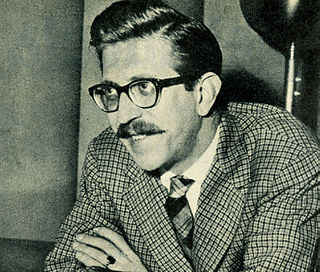
Bruno Canfora was an Italian composer, conductor, and music arranger.
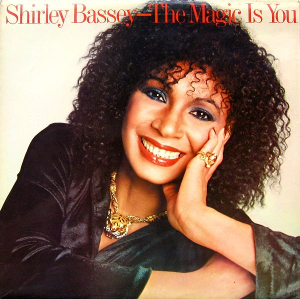
The Magic Is You is a 1979 album by Welsh singer Shirley Bassey. Her final album for United Artists Records, the album notably featured a disco version of her signature 1968 song "This Is My Life".

25th Anniversary Album is a compilation album by Shirley Bassey. Released in 1978 to mark her 25th year in show business, the album was a double set, comprising 40 tracks. The songs included span just 20 of the 25 years from 1957 to 1976, however, her first professional contract is dated 1953. Bassey had toured extensively throughout 1978 to mark her 25 years. This collection, including her biggest hits and some lesser-known recordings, became one of her biggest in the UK, where it reached No.3 and spent 12 weeks on the album chart.



















